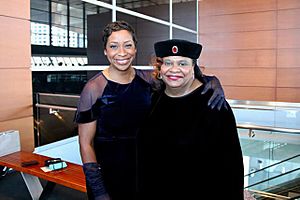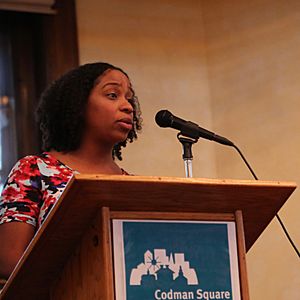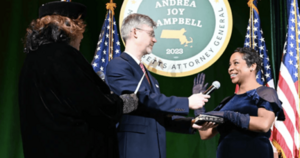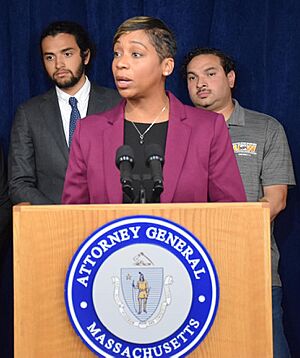Andrea Campbell facts for kids
Quick facts for kids
Andrea Campbell
|
|
|---|---|
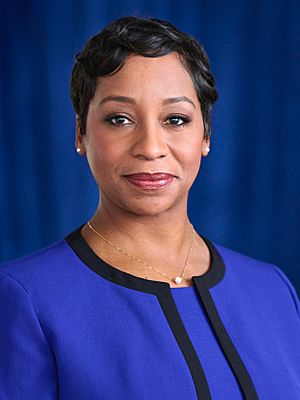
Official portrait, 2023
|
|
| 45th Attorney General of Massachusetts | |
| Assumed office January 18, 2023 |
|
| Governor | Maura Healey |
| Preceded by | Maura Healey |
| President of the Boston City Council | |
| In office January 2018 – January 2020 |
|
| Preceded by | Michelle Wu |
| Succeeded by | Kim Janey |
| Member of the Boston City Council from the 4th district |
|
| In office January 4, 2016 – January 3, 2022 |
|
| Preceded by | Charles Yancey |
| Succeeded by | Brian Worrell |
| Personal details | |
| Born | June 11, 1982 Boston, Massachusetts, U.S. |
| Political party | Democratic |
| Spouse | Matthew Scheier |
| Children | 2 |
| Education | Princeton University (BA) University of California, Los Angeles (JD) |
Andrea Campbell is an American lawyer and politician. She has been the top lawyer for the state of Massachusetts, called the Attorney General, since 2023. She is a member of the Democratic Party. Before becoming Attorney General, she was on the Boston City Council from 2016 to 2022. She even served as the council's president from 2018 to 2020. In 2021, she ran for mayor of Boston but did not win.
In 2022, Andrea Campbell decided to run for Attorney General of Massachusetts. She was the first Black woman to be on the ballot for a statewide election in Massachusetts. She won the Democratic Party's nomination and then won the main election by a lot. In January 2023, she officially became the Attorney General. She is the first Black woman to hold this important job.
Contents
- Andrea Campbell's Early Life and School
- What Did Andrea Campbell Do Before Politics?
- Andrea Campbell on the Boston City Council
- Running for Mayor of Boston
- Andrea Campbell as Attorney General of Massachusetts
- Andrea Campbell's Views on Important Issues
- Andrea Campbell's Family Life
- How Andrea Campbell Has Been Elected
- Writings by Andrea Campbell
Andrea Campbell's Early Life and School
Andrea Campbell and her twin brother, Andre, were born in Boston, Massachusetts. They also have an older brother, Alvin Jr. When Andrea was very young, her birth father went to prison. Her birth mother died in a car accident when Andrea was only eight months old. Because of this, Andrea and her brothers lived in foster care and with different relatives.
Her aunt and uncle, Lois and Ron Savage, played a very important part in raising her. Andrea calls them her parents. She didn't meet her birth father until she was eight, after he was released from prison. She and her brothers then lived with him for a while.
Andrea grew up in the Roxbury and South End areas of Boston. These neighborhoods are important cultural centers for Black people in the city. She went to five different schools within the Boston Public Schools system. Andrea graduated from Boston Latin School, a well-known high school. Even though she did well in school, both of her brothers had spent time in prison by the time she was in high school.
Andrea went to Princeton University for college. When she was 19, her birth father passed away. She graduated from Princeton in 2004. Later, when she was 29, her twin brother died while he was in state care. He had a serious illness called scleroderma. After Princeton, Andrea went to UCLA School of Law and became a lawyer.
What Did Andrea Campbell Do Before Politics?
After finishing law school, Andrea Campbell worked as a lawyer. She spent a year at EdLaw, a group in Roxbury that gave free legal help to students and parents about their education rights. Then, she worked for two years at a law firm called Proskauer Rose. There, she advised companies in Boston and New York City on rules about jobs and workers.
She also worked for Boston's Metropolitan Area Planning Council for a few months. Later, she became a legal advisor to Governor Deval Patrick.
Andrea Campbell on the Boston City Council
How Did She Start on the Council?
In 2015, Andrea Campbell ran for the Boston City Council for the first time. She won the first round of voting and then beat the person who had been in the job for a long time, Charles Yancey. She won with 61% of the votes. Andrea Campbell was the first woman to represent her district on the council.
In 2016, she supported a plan to allow more charter schools in Massachusetts. Most of the other city councilors were against this plan. Teachers' unions and other groups criticized her for supporting charter schools. However, voters later rejected the plan.
Andrea Campbell and another councilor, Ayanna Pressley, tried to pass a rule that would stop employers from using a person's credit score to decide if they could get a job. They also supported a federal law that helps people who have been in prison get a second chance.
Becoming Council President
Andrea Campbell was re-elected to the City Council in November 2017 without anyone running against her. On January 1, 2018, she was chosen by her colleagues to be the president of the council. She was the first African-American woman to hold this position.
As council president, she suggested creating a city inspector general to watch over how the city government works. The mayor at the time, Marty Walsh, did not support this idea, and the council voted against it. She also suggested a tax on empty homes and businesses.
Andrea Campbell thought that City Council members should serve for four years instead of two. She believed this would make the council stronger. She also wanted to change how empty council seats were filled, suggesting special elections instead of giving the seat to the person who came in second in the last election.
After a controversial parade in Boston in 2019, Andrea Campbell said the city should review how it approves public events. She felt that too many public resources were used for events that caused problems.
In 2018, Boston magazine listed Andrea Campbell as one of the "100 Most Influential People in Boston." They believed she would continue to rise in politics.
Her Last Term on the Council
Andrea Campbell was re-elected to the council in November 2019. In January 2020, Kim Janey became the new council president.
In June 2020, Andrea Campbell voted against Mayor Walsh's budget plan. She argued that it did not do enough to address racial inequality in the city. She also suggested creating a police oversight board to make sure police officers are held accountable. The City Council later approved a different plan for police oversight, which the mayor signed into law.
In 2021, Andrea Campbell and Kim Janey proposed a rule to stop most employers in Boston from checking job seekers' credit scores. They argued that credit checks hurt people with lower incomes the most.
Andrea Campbell did not run for re-election to the City Council in 2021 because she decided to run for mayor instead.
Running for Mayor of Boston
On September 24, 2020, Andrea Campbell announced she was running for mayor of Boston. She said she wanted "real change and a real chance" for every neighborhood. During her campaign, she often disagreed with the acting mayor, Kim Janey, who was also running. Campbell pushed for stronger rules, like requiring businesses to ask for proof of vaccination.
The Boston Globe newspaper supported her campaign. Her plan included taking 10% of the Boston Police Department's budget and using that money for public health, economic fairness, and youth programs. She also wanted to remove police officers from schools and use those funds for mental health specialists instead.
In the primary election, Andrea Campbell finished third, which meant she did not move on to the final election.
Andrea Campbell as Attorney General of Massachusetts
Becoming Attorney General
On February 2, 2022, Andrea Campbell announced she was running for Massachusetts Attorney General. The previous Attorney General, Maura Healey, decided to run for governor instead.
Andrea Campbell's name on the ballot made history. She was the first Black woman in Massachusetts to be on the ballot for a statewide office. Maura Healey supported Campbell before the primary election. Campbell won the Democratic nomination and then won the general election to become Attorney General. She is the first Black woman to hold this office and only the second Black person ever, after Edward Brooke.
As a candidate, Andrea Campbell promised to look at issues through an "equity lens," meaning she would focus on fairness for everyone. She said she would use her office to help with health and economic differences, prison reform, and juvenile justice. She also promised to make sure no one was "above the law" and to rebuild trust in the justice system. She focused on making changes to the criminal justice system and addressing police misconduct.
Andrea Campbell won the November general election with 62.6% of the votes. She officially took office on January 18, 2023. Her swearing-in ceremony was held at the Boston Convention and Exhibition Center. Andrea Campbell has said that her main role as Attorney General is to be the "people's lawyer." Her husband, Matthew Scheier, held the Bible for her oath, and her aunt, Lois Savage, gave her the oath.
New Teams in Her Office
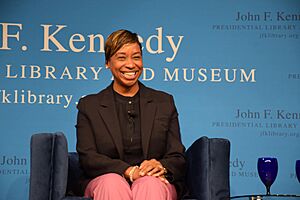
In April 2023, Andrea Campbell asked the state government for money to create four new teams within the Attorney General's Office. These teams would focus on:
- Reproductive Justice (protecting rights related to health care choices)
- Elder Justice (protecting older people)
- Gun Violence Prevention
- Police Accountability (making sure police are fair)
By early 2024, she had already set up the first three teams. In March 2024, she also suggested creating a team to work on making housing more affordable.

Working on Housing Rules
In March 2023, Andrea Campbell said she would take legal action against towns that were not following a new law about housing near public transportation. This law, passed in 2021, requires towns near the MBTA (Massachusetts Bay Transportation Authority) to allow more apartment buildings.
In February 2024, she filed a lawsuit against the town of Milton. Milton's voters had voted against allowing more apartment buildings, which goes against the state law. Campbell's lawsuit argues that the state law must be followed. She has asked the highest court in Massachusetts to hear the case.
Other Important Work
Andrea Campbell has also worked on other important issues:
- In February 2024, she announced that Massachusetts would receive $8 million from a national agreement with a company called Publicis Health. .....
- In May 2023, her office started looking into claims of racial bias within the Boston Police Department's gang unit.
- In April 2024, Massachusetts joined a lawsuit with other states to bring back protections for transgender people and other groups.
- In 2023, she suggested rules to stop "junk fees," which are hidden or unfair charges.
- In October 2023, after a Supreme Court decision about college admissions, Campbell and Governor Healey released new guidelines for colleges. These guidelines help colleges promote diversity by considering how life experiences, including those related to race, have shaped applicants.
- In March 2024, she started a group with the NCAA to teach young people about the dangers of sports gambling.
- In December 2023, Andrea Campbell filed a lawsuit against a group called the National Socialist Club 131. The lawsuit says the group has committed "violent" and "coercive" actions, including bothering events and intimidating hotels that help migrants.
Andrea Campbell's Views on Important Issues
Andrea Campbell is seen as a progressive member of the Democratic Party.
Justice System
Andrea Campbell believes that the police and the justice system in Massachusetts need to be improved. She supports changes that make the system more fair. She also thinks it's very important to fight government corruption. She has said, "No one should be above the law."
LGBTQ+ Matters
Andrea Campbell supports access to gender-affirming care. She also believes that transgender student athletes should be able to play on sports teams that match their gender identity.
Education
Andrea Campbell has long supported charter schools. In 2016, she voted "yes" on a plan to allow more charter schools in Massachusetts.
Drug Policy
..... However, when she ran for Attorney General, she said she did not support such sites at the state level.
Diversity and Fairness
Andrea Campbell did not agree with the 2023 Supreme Court decision that said colleges could not use race as a main factor in admissions. She said the ruling "undermine[s] and discount[s]" the history of the United States. After the case, she worked with Governor Healey to create new guidelines for colleges to promote diversity. She also supports private companies having their own diversity efforts.
Andrea Campbell's Family Life
Andrea Campbell was born in Boston. Her birth mother and father passed away when she was very young. She considers her aunt and uncle as her parents. By the time Andrea was in high school, both of her brothers had spent time in prison. When she was 29, her twin brother died while in state care.
Andrea Campbell often talks about the challenges she faced, like her mother's death, her father being absent, and her time in foster care. She has said that sharing her story helps others. She credits her family, teachers, and employers with helping her succeed. Throughout her career, she has said that her family's experiences with unfairness and the justice system have shaped her views.
Andrea Campbell is married to Matthew Scheier. They have two sons. She used to live in the Mattapan neighborhood of Boston. In November 2024, Andrea Campbell and her husband bought a new home in Dartmouth, Massachusetts, where they plan to live.
How Andrea Campbell Has Been Elected
City Council Elections
| 2015 Boston City Council 4th district election | ||||
|---|---|---|---|---|
| Candidate | Primary election | General election | ||
| Votes | % | Votes | % | |
| Andrea Campbell | 1,982 | 57.92 | 4,311 | 61.32 |
| Charles Yancey (incumbent) | 1,159 | 33.87 | 2,701 | 38.42 |
| Terrance J. Williams | 217 | 6.34 | ||
| Jovan J. Lacet | 60 | 1.75 | ||
| all others | 4 |
0.12 | 18 |
0.26 |
| Total | 3,422 | 100 | 7,030 | 100 |
![]() write-in votes
write-in votes
| Candidate | Votes | % | |
|---|---|---|---|
| Andrea Campbell (incumbent) | 8,027 | 98.64 | |
| Write-ins | 111 | 1.36 | |
| Total votes | 8,138 | 100 | |
| Candidate | Votes | % | |
|---|---|---|---|
| Andrea Campbell (incumbent) | 4,558 | 87.15 | |
| Jeff Durham | 637 | 12.18 | |
| Write-ins | 35 | 0.67 | |
| Total votes | 5,230 | 100 | |
Mayoral Election
| 2021 Boston mayoral election | ||||
|---|---|---|---|---|
| Candidate | Primary election | General election | ||
| Votes | % | Votes | % | |
| Michelle Wu | 36,060 | 33.40 | 91,794 | 63.96 |
| Annissa Essaibi George | 24,268 | 22.48 | 51,125 | 35.62 |
| Andrea Campbell | 21,299 | 19.73 | ||
| Kim Janey (acting incumbent) | 21,047 | 19.49 | ||
| John Barros | 3,459 | 3.20 | ||
| Robert Cappucci | 1,185 | 1.10 | ||
| Jon Santiago (withdrawn) | 368 | 0.34 | ||
| Richard Spagnuolo | 286 | 0.26 | ||
| Scattering | 0 | 0.00 | 595 | 0.41 |
| Total | 107,972 | 100 | 144,380 | 100 |
Attorney General Election
| Party | Candidate | Votes | % | |
|---|---|---|---|---|
| Democratic | Andrea Campbell | 1,622 | 39.2 | |
| Democratic | Quentin Palfrey | 1,605 | 38.8 | |
| Democratic | Shannon Liss-Riordan | 906 | 21.9 | |
| Total votes | 4,133 | 100.0% | ||
| Party | Candidate | Votes | % | |
|---|---|---|---|---|
| Democratic | Quentin Palfrey | 1,920 | 54 | |
| Democratic | Andrea Campbell | 1,631 | 46 | |
| Total votes | 3,551 | 100% | ||
| Party | Candidate | Votes | % | |
|---|---|---|---|---|
| Democratic | Andrea Campbell | 365,362 | 50.10% | |
| Democratic | Shannon Liss-Riordan | 248,648 | 34.10% | |
| Democratic | Quentin Palfrey (withdrawn) | 115,200 | 15.80% | |
| Total votes | 729,210 | 100.0% | ||
| 2022 Massachusetts Attorney General election | |||||
|---|---|---|---|---|---|
| Party | Candidate | Votes | % | ±% | |
| Democratic | Andrea Campbell | 1,539,624 | 62.85% | -7.06% | |
| Republican | James R. McMahon, III | 908,608 | 37.09% | +7.07% | |
| Write-in | 1,550 | 0.06% | -0.01% | ||
| Total votes | 2,449,782 | 100.0% | |||
| Massachusetts Democratic Party hold | |||||
Writings by Andrea Campbell
- "Is Boston's Booming Economy Making Our City Better Or Destroying It? The Truth Lies Somewhere In Between", WBUR, February 13, 2020.
- "What The Pandemic Is Doing To My Boston Neighborhood", WBUR, April 24, 2020.
- "We Can't Make Sweeping Structural Change If Our Leaders Don't Understand Racial Equity", WBUR, June 4, 2020.
- "Boston Needs to Take More Decisive Measures on COVID-19", The Boston Globe, August 19, 2021.
- "How Will Mayoral Candidates Address Inequities and Empower Black Bostonians?", The Boston Globe, September 24, 2021.
- "Massachusetts Should Ban Third-party Electric Suppliers", The Boston Globe, September 29, 2024 – co-authored with Michelle Wu.
 | Selma Burke |
 | Pauline Powell Burns |
 | Frederick J. Brown |
 | Robert Blackburn |


